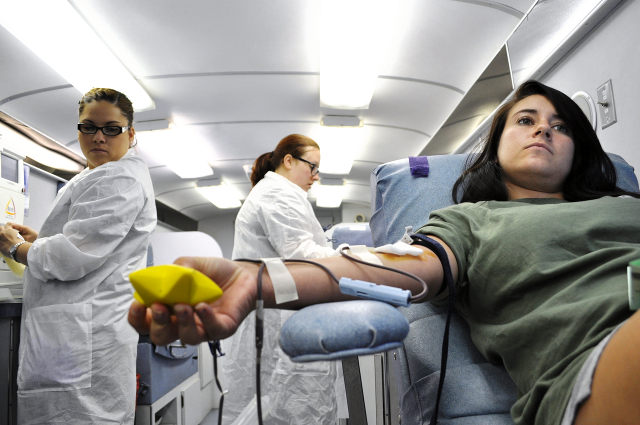For Blood Banks, Tragedy Brings Out the Donors

University of Texas senior Maraya Camazine donates blood at a Blood Center of Central Texas mobile donation bank on campus. Photo by Gabriel Cristóver Perez.
By Hannah Shea
For Reporting Texas
Bryant Aburto, an Austin DJ, says he faints at the sight of blood. But after he heard about the explosion at the fertilizer plant in West, he didn’t hesitate to drive to the Blood Center of Central Texas to donate.
Cindy Rowe, public relations manager at the blood center, says the collection goal on an average day is 200 units of blood, or between 1,200 and 1,400 units per week. The day after the April 17 explosion in West, it collected roughly triple that, with an overwhelming number of people coming to donate.
“We saw over 740 donors. Over 1,000 people came to donate, but we had to ask a lot of them to pledge to come back,” said Rowe, who recalls 9/11 being the last time they saw so large a turnout. The blood center sent more than 200 units of blood to use in treatment of West victims.
Rowe says that in the wake of tragedy, it’s human nature for people to want to help, and the first thing they think of is donating blood. The number of people wanting to donate in the initial aftermath of a tragedy is far greater than those wanting to donate blood a month or so down the line. To avoid those spikes, many blood banks encourage donors to pledge to make appointments in the coming weeks, and according to Rowe, more than half of the appointments are honored.
The day after the explosion in West, the center expanded its hours to draw as much blood as possible. It normally closes at 6 p.m. but was still drawing blood at 8 p.m. Rowe reports that in addition to bringing in extra staff, the center also used its mobile donation buses to handle the overflow of donors. It also opened its Round Rock location, which was supposed to be closed that day.
Records from the American Association of Blood Banks show that in times of disaster, donations spike. Its 2005 National Blood and Utilization Survey shows that in 2001, around the time of 9/11, blood donations increased dramatically and decreased just as dramatically in the following years.
A 2002 article in the The New Republic also reported that donor rates crashed several weeks after the initial disaster occurred. Fewer than 10 percent of the donors waiting in line at one Manhattan donation center who were asked to make a follow-up appointment actually returned.
As a result, according to the article, between 100,000 to 300,000 units of blood donated in the initial outpouring went unused. Then, in the crash after 9/11, blood banks had to issue an emergency appeal for donations to bolster the nation’s minimal blood supplies.
According to Rowe, one of the biggest challenges for blood bankers in the aftermath of a tragedy is making sure that they don’t collect too much blood. Blood has a shelf life of about 42 days, she says, while platelets, a blood component, have a shelf life of only five days.
Rowe says the Blood Center of Central Texas periodically experiences shortages, for instance around school vacations. To remedy this, the center occasionally reaches out to the media to plead for more donors. The center also has a donor program set up in which each donation earns points that count toward redemptions from an online store. In times of serious shortage, the center offers double or even triple the points that one would normally earn, in addition to ice cream.
Blood banks generally encourage people to donate quarterly, roughly four times a year, so they can maintain a strong blood supply of all types and respond to tragedies. The Blood Center of Central Texas is the exclusive provider for blood for over 37 facilities in 10 counties.
Aburto, the DJ, grew up in New York City and remembers 9/11.
“The main reason why I wanted to donate was because I’ve seen first person how awful events like these are,” Aburto said. “The amount of destruction and the number of people who lost their lives or were injured is unbelievable, but I was too young to really know what to do to help. I figure now is my chance to do my part to help people in similar situations. I hate blood but I know it can be invaluable to people in need.”